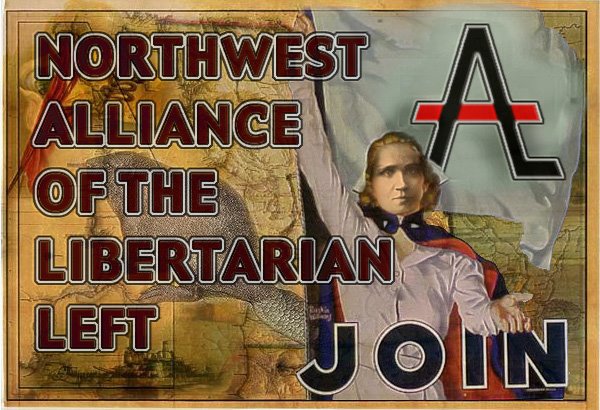Keep on rocking in the free world: Anarchist Communications
Upcoming
Anarchy Summer Camp. 17-19 July 2009. Northern Virginia. Anonymous, Infoshop News (2009-06-12): Virginia: Anarchy Summer Camp 17th-19th, Nova.
As we prepare for the upcoming G20 summit in Pittsburgh, the Spring World Bank and IMF meetings, the ebbs and flows of our respective local campaigns, and anything else under the sun, we’ll be congregating in the woods of Northern Virginia for an action-packed Anarchy Summer Camp.
Belfast, Ulster. 18 July 2009. Organizing for Anarchism. Belfast: Organising for Anarchism. A day of workshops and discussions organised by the Belfast branch of the Workers Solidarity Movement and the Anarchist Communist Discussion Group. (High Church Platformism, in case you’re curious.)
Sao Paulo, Brazil. 18-19 July 2009. 2nd Encounter towards a Sao Paulo Anarchist Federation.
The Pr?@c3;b3;-Federaç?@c3;a3;o Anarquista de S?@c3;a3;o Paulo collective invites everyone to participate in the 2nd Encounter towards a Sao Paulo Anarchist Federation on 18-19 July 2009 in the city of Sao Paulo, Brazil. … It was from that Encounter che this collective was formed, with the aim of carrying on the debate. The purpose of this second Encounter, then, is to present and discuss the collective’s experiences and the work done so far, and also to invite new comrades to join us. Over this first year, the participants have engaged in many activities with the aim of joining the popular struggles and contributing social and practical ideas such as direct action, autonomy, combativity, solidarity, horizontality and independence from parties.
(Especifismo, if you’re curious.)2009 Northeast Anarchist People of Color Conference. 6-9 August 2009. Philadelphia, Pennslvania. The conference announcement, mission sttaement, and Principles of Unity are all available from http://illvox.org/.
Providence, Rhode Island. 15 August 2009. Providence Anarchist Bookfair and street festival. Anonymous @ Infoshop News (2009-06-28): Providence Anarchist Bookfair and street festival
The annual Providence Anarchist Bookfair is back again this year and we want you to come on by and enjoy the events , get some books and participate. … In the past there have been workshops and interactive presentations on radical and revolutionary topics , please feel free to submit workshop proposals or hit us up to get a table.
Openings, anniversaries, report-backs, etc.
Toledo, Ohio. Summer 2009. The Black Cherry community space. A new coffee-and-info-shop opening this summer in Toledo under the auspices of the October 15 Anarchist Collective. 1420 Cherry St., Toledo, Ohio.
Santa Cruz, California. June 2009. SubRosa community space. SubRosa celebrates six months!
SubRosa is a non-profit space in downtown Santa Cruz for art and radical projects run by a collective of volunteers from the local anarchist community. It offers radical books and literature, gourmet coffee and tea, performance and a weekly open mic, gallery art by emerging local artists, and a garden courtyard social space. Free wi-fi and public computers are also available for use. A variety of radical community events are held at SubRosa, including monthly art shows, Free Skool classes and a weekly Open Mic on Thursdays at 8pm.
United Kingdom. Free Activist Records. Anonymous, Infoshop News (2009-07-16): New donation based UK anarchist record label launched.
A new free to download donation based record label
Free Activist Records
has just been launched. Our first release will be a 20 track compilation to raise awareness of Sean Kirtley anarchist AR prisoner. We are a small collective of music lovers, artists, punks, workers and activists. We are veganarchist, anti-consumerist, anti-fascist, anti-millitary, pro union, feminist, pro-choice, anti-globalization, anti-authority and we support direct action to smash oppression it all of its forms, whether it come from the state or corporations. We also love music. … We rely on help from, bands, illustrators, artists, promoters, activists groups and YOU to keep FAR running. Please do contact us to find our what help we need.East London, England. Anarchist Movement Conference 09. Another, very detailed reportback: Infoshop News (2009-06-13): Britain: More on the Anarchist Conference 09. (See GT 2009-06-10: Wednesday Lazy Linking for previous report-backs and No Pretence’s anarcha-feminist intervention.)
Tampere, Finland. 10-12 July 2009. Musta Pispala: Anarchist counter-cultural festival. via Anonymous @ Infoshop News
For us anarchism means for example the critique of all forms of domination and hierarchy and on the other hand creating non-oppressive, egalitarian culture. We see domination not only in large structures of society, but also in oppressive customs among ourselves. Our analysis is not limited only to human relations. It also includes our relationships with non-human beings. Our aim is to strengthen critical views and empowerment in the form of taking control of our lives. Kill the police within! Through the workshops in the festival you can get familiar with topics such as basics of anarchism and anarcha-feminism. There will be a couple of workshops on anarchist parenting and unschooling. Anti-psychiatry criticizes mainstream views on mental problems, and offers alternatives for mental care. Environmental themes are approached practically and theoretically through worm-composting, edible wild plants, climate change and the environment and technology thinking of anarchists. We also have workshops about specifically local struggles such as anti-gentrification/yuppification and a counter campaign against the city council’s efforts to clean the streets of Tampere from street art and posters of small scale events.
Antioch, California. 20 June 2009. Antioch Arrow Block Party Antioch Block Party Report Back



